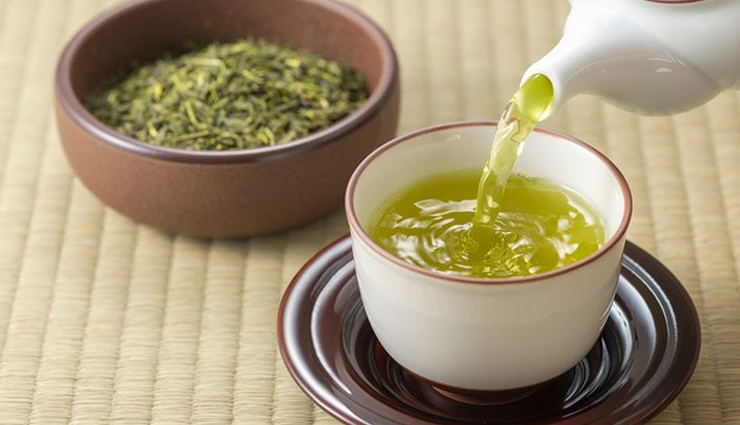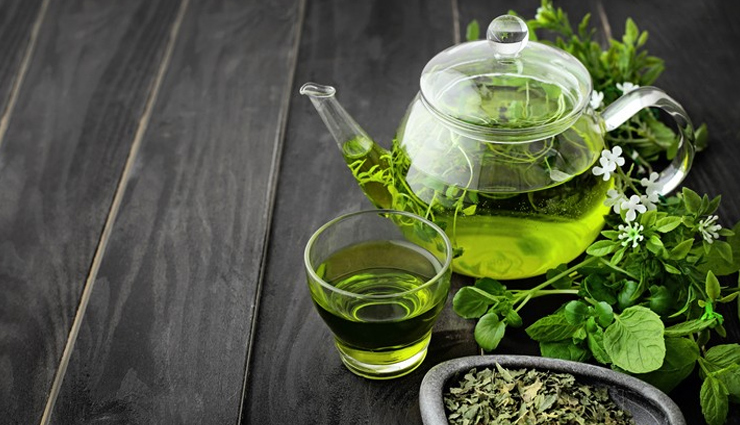- Home›
- Healthy Living›
- 5 Side Effects You Might Experience From Drinking Green Tea
5 Side Effects You Might Experience From Drinking Green Tea
By: Priyanka Maheshwari Wed, 27 May 2020 12:46:29

While drinking tea is considered mostly safe for adults, there are a few side effects to keep in mind. Most of the side effects of green tea consumption can be avoided by consuming only moderate amounts. Many of these side effects only occur when consumed in massive amountssomething most tea drinkers don't do. For most people, it would be a challenge to consume the amount of green tea required to trigger these side effects. However, certain individuals with sensitivities to ingredients in green tea should also avoid this beverage. The main compound in green tea that causes reactions in sensitive individuals is caffeine. It's important to recognize that most of these side effects can be attributed to the mild amount of caffeine in green tea. In general, if you drink a cup of coffee without these symptoms, you're unlikely to experience negative side effects from drinking green tea.
Green tea is made from the tea plant known as Camellia sinensis, just like other true teas such as black tea, white tea, and oolong teas. It is one of the least processed true teas. All true teas contain caffeine and green tea is no exception. It has been used for centuries as a medicinal tool in Ayurveda from India and traditional Chinese medicine to treat everything from fever to heart disease.
Green tea boasts health benefits that include accelerated weight loss, cancer prevention, and blood pressure benefits. It has also been shown to prevent neurological diseases such as Alzheimer's disease and Parkinson's. Green tea has also been promoted as an alternative to coffee for people who are trying to reduce their caffeine intake. That’s because green tea contains an amino acid known as L-theanine, which helps to regulate blood sugar levels and slows the absorption of caffeine. This evens out the energy kick so you don’t get the jitters.

* Stomach Problems
Green tea may cause stomach irritation when brewed too strongly or consumed on an empty stomach. Green tea contains tannins that can increase the amount of acid in your stomach. Excess acid can lead to digestive issues including constipation, acid reflux, and nausea. Brewing green tea with water that is too hot can exacerbate these side effects. Brew your green tea with water between 160 and 180 F.
Green tea can also cause diarrhea when consumed in large amounts. Caffeine produces a laxative effect as it stimulates the colon muscles to contract and release more frequently. This results in more frequent trips to the bathroom and can cause upset stomach. If you suffer from irritable bowel syndrome, avoid green tea.
* Headaches
Green tea can cause headaches in certain individuals since it contains caffeine. People who suffer from migraines can consume green tea occasionally. However, you should avoid drinking green tea every day if you suffer from daily headaches. If you have caffeine sensitivity, avoid drinking green tea.

* Problems Sleeping
Green tea contains a compound that is antithetical to sleep: caffeine. Green tea contains only small amounts of caffeine, but may still cause problems sleeping for people sensitive to caffeine. This is due to the fact that chemical compounds in green tea prevent the release of hormones such as melatonin, which aid in sleep.
* Anemia and Iron Deficiency
Green tea contains antioxidants that hinder the iron absorption in the human body. A meta-analysis showed that this side effect can be a particularly dangerous for people who suffer from anemia or other disease where iron deficiency is present. One case study found that green tea caused anemia in a 48 year old businessman who consumed 1500 milliliters (6 cups) of green tea every weekday for years. To avoid this side effect, add lemon to your tea. The vitamin C in lemon promotes iron absorption, counteracting this side effect. Alternatively, you can consume gren tea one hour before or after a meal. This gives your body time to absorb iron without the inhibition caused by tannins. As a precaution, avoid green tea if you have anemia.
* Vomiting
Excessive amounts of green tea can lead to nausea and vomiting. That's because green tea contains tannins that have been linked to nausea and constipation because of the way proteins bind in the intestines. Avoid consuming more than 4 cups of green tea each day if you are a seasoned tea drinker. If you're just starting out with green tea, start with 1 or 2 cups per day and monitor your reaction. Only increase consumption if you experience no side effects.





